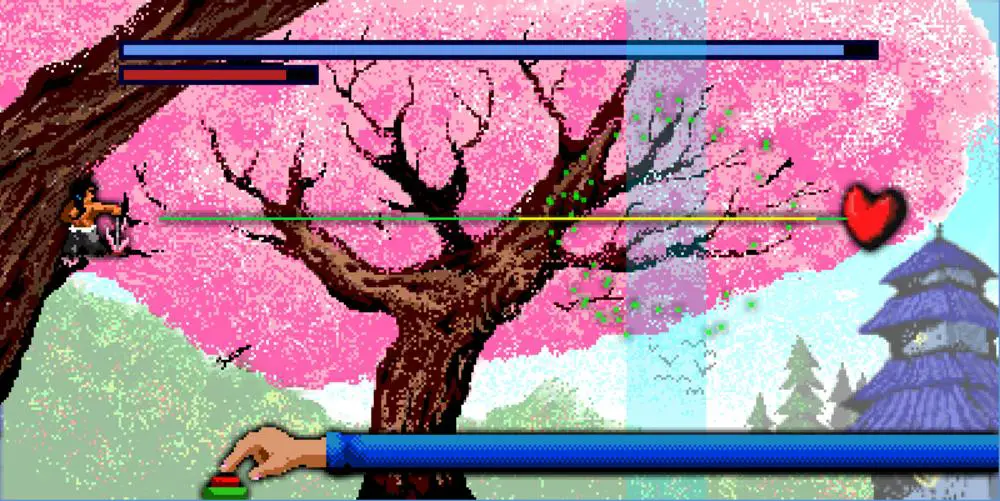

It feels like a karaoke number where you have to respond on the last beat of each line, but since each line is sung differently, you might want to check out the visuals here (which aren’t impeded by any hindrances this time around). The seven-beat gameplay is back, but now you have to contend with four characters rather than one, with backbeats and different timing signatures present throughout the song. The third stage is a lighthearted ballad featuring one of the main characters, and acts as a call-and-response piece, with a nurse busily attending to patients. It’s something that I wonder how the developers will recreate with other platform ports, and the track is a techno-laden joy to listen to. I loved this gimmick, and I haven’t been this impressed with interface abuse since a certain fight in Undertale. This stage changes the seven-beat gameplay to a two-beat one, but it’s just as complex due to the screen shaking everywhere. It’s a visually ambitious task, but it works very well and adds to the immersion of the stage. The screen shrinks and actually moves during the song, thus hopping around your desktop.

The second stage was my favorite of the whole experience. You can watch some footage of an earlier demo build below, and tap along if you prefer. The fourth stage is a harder variation of this one, but includes much more interface screw and a consequently catchier track.

(The situation is as weird as you think it is.) the basic seven beat gameplay is hindered by interference due to a “Wi-Fi jamming virus” affecting your screen, and you’ll have to keep a steady beat in order for your patient to survive. The first stage feels like an odd samurai number, where you have to operate through a remote connection. The demo features four single-player stages, each of which is a remarkably different scenario. The music is greatly varied, with traditional Japanese, techno, and light pop music represented within the demo. This does mean that newcomers might get a little frustrated at the game (especially on stages with a lot of on-screen distractions), but rhythm game veterans will find a lot to love here. This was intentional due to the developer’s desire to make people learn music theory while playing, and while it won’t make you a musical genius by the end, you’ll pick up a few rhythmic techniques that can help you out at your next jam session. While unforgiving, in time you end up learning time signatures and layout of the stages, so you can power through each of them with a bit of practice. You’ll also have to listen to audio cues rather than rely on visual ones, as a lot of the stages have ways of screwing with your vision, leading you to learn rhythms on the fly. Hitting any beat early or late will cause you to miss, and you’ll have to adapt to the stages quickly lest you perish or fail your mission. Rhythm Doctor follows suit, offering some pretty pixel art (which runs reliably on pretty much any computer or laptop) and some insane timing. What separated Rhythm Tengoku was the graphical art style as well as the crushing difficulty and timing. While it wasn’t officially released stateside, the game is easy enough to understand (and it’s import-friendly due to the region-free handheld).

You see, playing Rhythm Doctor reminded me of the original Rhythm Tengoku, the last official Game Boy Advance game released in Japan. And if that metaphor was incomprehensible, that’s because it is. This seems simple enough, but the game takes this premise and turns it upside down, fries it in an omelet, and hits the club faster than you can shake a stick at it. Most stages operate on seven beats, where all you need to do is press the spacebar on the seventh beat in time with the music. Like some of the best rhythm games out there, Rhythm Doctor starts out silly: you have to help patients through the power of music and your sense of timing. A simple premise with a killer soundtrack and challenging difficulty, I can say without a doubt it’s an indie that every music game fan should try out.
Rhythm doctor developer Pc#
Likewise, 7th Beat Games announced its game Rhythm Doctor for PC next year and I got to play a short demo. In recent memory, I’ve been entertained by the Rhythm Heaven franchise, an inexplicable collection of rhythmic minigames that can only come from from the makers of Warioware. I’m always in the mood for wacky, weird, and wonderful rhythm games: the crazier the better, I always say.


 0 kommentar(er)
0 kommentar(er)
